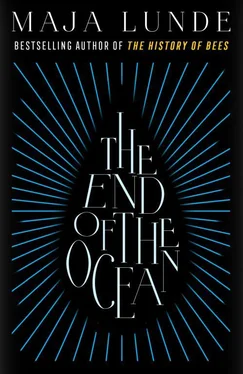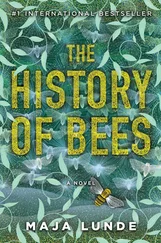Several times I went to the first-aid clinic. But it was still closed.
I asked a security guard. He didn’t know anything, hadn’t seen the doctors for several days.
And there was still no toilet paper.
In the afternoon Francis was gone for a long time. I started wondering whether he had given up on us and I had worked up some anger by the time he came back. But the anger melted away when I saw what he’d found.
A soda. A can of sugary soda. I couldn’t remember the last time Lou had had something like that.
“Where did that come from?” I asked.
“She needs sugar and fluids,” he said. “And salt.”
He held out a small bag of kitchen salt. “Before you give her the soda, pour this in it.”
He gave me the salt and the can of soda. I sat there holding the can in my hand, taking in the sensation of the smooth metal against my fingers.
The list of ingredients included additives. Artificial sweeteners, with neither fruit nor berries.
But the sugar was the most important thing, after all. And the salt.
*
She slept for another few hours. But more calmly and she woke up less and less frequently.
Then, around midnight, something finally happened.
I had fallen asleep, and was lying in bed directly across from her, but I woke up immediately when I heard her talking.
“Thirsty,” she said. “Daddy?”
I sat up quickly.
“Yes.”
I rushed to open the can. The sound was the most beautiful thing I had heard in a long time. The sigh of the bubbling carbonation when I lifted the aluminum tab.
“Soda?” Lou said. “Soda!”
“Wait,” I said.
I poured some of the salt into the soda. It fizzed upon contact with the carbonated liquid.
I put one hand under her head and held the can up to her lips with the other.
She swallowed.
She drank. Large gulps.
Finally she was drinking. My child was drinking.
The sound of the storm is in my body. I awaken with a start and it is still roaring in my ears, but then it’s gone, because it’s the silence that’s creating a din inside me now. I am lying on the floor, can’t remember coming in here, I must have collapsed from exhaustion, all curled up halfway beneath the table, the ice containers looming over me. My body is stiff and sore. I push myself up into a sitting position and can feel how every part of me aches.
Magnus, you stood there at the party and looked right at me, steady and calm through and through, and after that it was the two of us.
Not dramatically and intensely, but slowly. Years passed before we did anything more than look at one another, before we had a proper conversation, before we held hands and walked down the gravel road in the village, before we sat down at the far edge of the pier, out of sight, and kissed tentatively the first time, before I let go of your hands to touch other parts of your body, under wool sweaters and singlets that smelled of boy, the smooth skin on your back, before we clung to one another with all the desire we still didn’t know what to do with, before we walked down the road and talked, talked, talked, about everything, and especially about how there was nobody else we could talk to exactly like this.
We walked, away from the fjord, away from the water and the valley and up towards the mountain, because there we could be alone. The mountain and the glacier were our landscape during these years.
And then we moved away from the village. I remember how we stood on the deck of the steamer, looking at Ringfjorden at the end of the trail that was the backwash, the village growing smaller and smaller and everything inside me growing lighter.
We chose Bergen. He was the one who wanted to move there.
“It’s a short trip home,” he said.
“You call it home ,” I said.
“It will always be home.”
“Not for me.”
“I’ll talk to you about that in a few years.”
“If you’re so certain it will remain home , we can just as well move further away.”
“Bergen is good.”
“Bergen is wet.”
“Wet is good.”
“Home is where the heart is.”
“What?”
“They say home is where the heart is. But it’s a cliché and, besides that, weak, linguistically speaking. Hearts can’t be somewhere without the people who have them.”
“Fine. I’ll stop calling Eidesdalen and Ringfjorden home.”
“You can call it what you want as far as I’m concerned.”
“You are home to me.”
“How sweet.”
“Isn’t it?”
“And that ’ s pretty feeble as well, linguistically speaking.”
“I figured you’d say that.”
But we stayed in Bergen, I accepted it. I accepted a lot from him during that period. We attended the same university college; he studied engineering, I studied journalism, but our free time was our own and we followed only the minimum number of lectures, because there were so many other things going on. It was as if the city, the country of Norway, had just woken up. We looked towards the world, became a part of a huge movement, fought alongside people from all over the world against the Vietnam War, nuclear power, atomic test bombings in the Pacific Ocean, but also fought our own battles, against the European Community, for legalized abortion and the right to choose, for the conservation of Norwegian natural resources and wildlife.
I remember the back of his neck in front of me in the First of May parade—he always walked a bit more quickly than I did, but unintentionally. He would stop from time to time, catch himself doing it, smile apologetically and take my hand. Then we would walk a few yards together, before something or other distracted him and pulled him ahead of me again and I would walk and look at the back of his neck, thinking that he wasn’t wholly mine, but nonetheless knowing that he was. I remember thinking that he walked quickly because of his enthusiasm, his engagement. It wasn’t until later that I understood that he maybe just wanted to get it over with.
We each had our own bedsit, but always slept together, usually in his bed—it was wider than mine and his bedsit larger; he had a separate bed recess, almost a separate bedroom. There was something homey about having the living space divided up like that, I thought, something adult, and he had also put more effort into fixing up his apartment, had worked hard to create a home. Mine was just a room where I stayed when I needed a place to sleep and he wasn’t around.
The bed was a place we slept, but also a place we lived; after having made love, naked, our bodies entangled, we chatted, sleepily stroking one another’s chests, hair, arms, backs, and also before we slept together, full of anticipation, sometimes lazy, uncertain of whether we could be bothered, sometimes we just talked, that was sometimes enough, but usually we still wanted one another. We ate in bed, drank red wine, neglected to brush our teeth, woke up with blue teeth and laughed at one another, but even tolerated each other’s morning breath, inhaled that as well, deep into our lungs, because we wanted to be completely filled with one another.
And we talked. His bed became the site for all our conversations and all his plans. Because he made plans, more and more plans, more and more often. He asked me about the future, about my expectations, about my wishes, and he searched through all my answers, sort of casually, for the points where they coincided with his wishes and expectations.
“How do you see it? How will we live?” he asked.
“I don’t know… a garden, maybe?”
“I’ve thought about that too. A big old wooden house and a garden. And apple trees, I want to have a lot of apple trees, don’t you?”
Читать дальше










